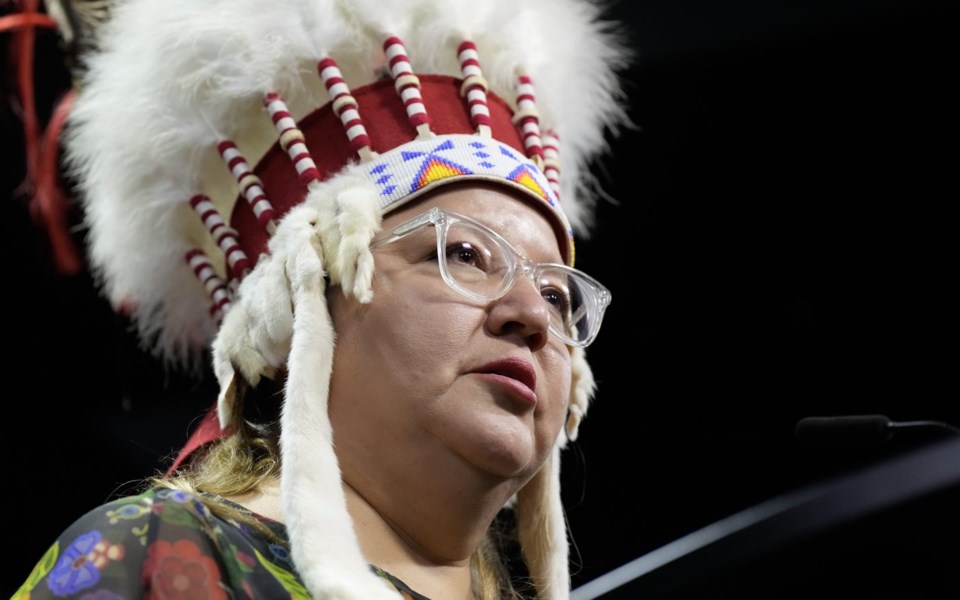OTTAWA — The national chief of the Assembly of First Nations says there are 47.8 billion reasons for chiefs to accept a child welfare reform deal with Canada, but a leading child welfare expert is warning chiefs to review the fine print.
National Chief Cindy Woodhouse Nepinak has been promoting a settlement that would see the federal government set aside $47.8 billion over 10 years to reform the First Nations child welfare system across the country.
The deal was struck after decades of advocacy and litigation from First Nations and experts, seeking to redress decades of discrimination against First Nations children who were torn from their families and placed in foster care because the child welfare systems on reserves were not funded to provide services that could keep families together.
The federal government is responsible for child welfare on reserves and provincial governments oversee child welfare programs everywhere else. But Ottawa’s funding was only on par with the provinces when it came to foster care because they had to pay provincial agencies to provide that service at provincial rates.
The AFN is set to ratify the agreement at a special assembly in September, should chiefs agree to its contents.
Cindy Blackstock of the First Nations Child and Family Caring Society, who helped launch the initial complaint that led to the agreement, spoke to chiefs in Saskatchewan on Tuesday about the draft deal.
"Based on what I know now, this is not a good thing for our kids. I think we can do much better," she said at an event organized to discuss the agreement.
"And the way we do much better is to make sure it's an inclusive and transparent process where we have the people who are working with families, and the leadership in communities, as part of the process."
Woodhouse Nepinak, meanwhile, defended the agreement in Winnipeg.
"Canada has pursued its colonial policies — they have attacked our Nations by removing our children from their parents, their homes and communities for generations," Woodhouse Nepinak said at a press conference.
"The final settlement agreement represents a significant step toward dramatically improving services for First Nations children after generations of abuse at the hands of federal and provincial child welfare systems by directing funds to First Nations."
Blackstock says she wonders how the AFN is expected to present chiefs with nuanced information about the settlement agreement, because a clause in the deal instructs them to publicly promote and defend it.
"In my view, consultation involves kind of giving people the straight goods — the downsides of things," Blackstock said in an interview.
"It's not about selling an agreement. It's about saying, 'Here are the different options, and these are the upsides and downsides as we see them.'"
Blackstock also questioned why Canada isn't taking a more leading role in the consultations, given they have the duty to consult with First Nations, not the AFN.
"They're nowhere to be seen," she said.
"They seem to be putting these First Nations organizations out in a window to do their consultation. But really, the minister should be out there talking to chiefs."
Indigenous Services Canada spokesperson Anispiragas Piragasanathar said in a statement that Canada "should not and will not be telling First Nations organizations how to engage their own members."
Woodhouse Nepinak defended the clause Tuesday, saying it's important for regional chiefs to speak to their assemblies and that promoting the agreement ensures more people are aware of it.
"At the end of the day, First Nations will decide whether this agreement goes ahead or not," Woodhouse Nepinak said. "They can change any clause that they so wish. They can recommend any clause that they want changed."
With the vote scheduled to take place in less than a month, Blackstock questioned how 633 First Nations will have an opportunity to submit amendments. She said there are no clear processes laid out by the AFN for chiefs to debate potential amendments ahead of the special assembly.
"Where's the process?"
Blackstock is also concerned service providers are excluded from the agreement, along with youth in care with lived experiences who are crucial to ensure the agreement actually works on the ground.
She's said the agreement does not provide adequate mechanisms to hold Canada accountable, saying the governance is too secretive as decision-making power is taken away from chiefs.
"That's not, to me, set up for success," she said, adding she is also concerned that many First Nations agencies and communities will be left underfunded. Some parts of the agreement have yet to be made public either.
And given the agreement was reached outside of the 91Ô´´ Human Rights Tribunal, Blackstock says funding is less secure as it's subject to parliamentary allocation.
Woodhouse Nepinak said "we need to create our own mechanisms — our own 91Ô´´ Human Rights Tribunals for ourselves — instead of all these other ones being put (forward) that sort of that are flawed and that fall short for First Nations."
The agreement has been the subject of testy discussions for months, including in June when four regional chiefs representing First Nations in Saskatchewan, British Columbia, Quebec-Labrador and New Brunswick wrote to Woodhouse Nepinak decrying what they said was AFN deal making with Canada in secret.
Chiefs Bobby Cameron, Terry Teegee, Ghislain Picard and Joanna Bernard represent more than half of First Nations in Canada.
Consultations on the agreement are being held over the summer, while a final vote is expected to occur in Winnipeg this September.
Blackstock said chiefs should get their own legal counsel and experts to comb through the agreements rather than relying solely on those sessions.
"And I would alert them to those paragraphs where the parties are obliged to promote it."
This report by The 91Ô´´ Press was first published Aug. 21, 2024.
Alessia Passafiume, The 91Ô´´ Press



